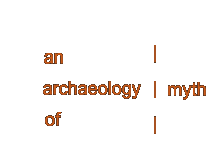
We live in a culture that locates itself atop a fault line: Reality || Myth.
 |
|
|
Science claims to represent objective reality, a discoverable, measurable, and explainable order of things. Science erases myth and replaces it with factual knowledge. Science presents a comprehensive and exclusive explanatory scheme that claims to describe and map reality, but the reality apprehended by way of science always seems short of its claims for itself and for the way we are to think about the world. Science privileges objectivity over subjectivity, legitimizes the objectivity/ subjectivity split and devalues sensibilities found in the intelligence of stories. Science sets itself up against myth. It is not the fanciful and rhetorical claims to omnipotence that make science mythic, but the transformative power of its totalizing claim on our imagination that makes Science yet another myth. The Science Myth found its way into law with the help of Christopher Columbus Langdell who held that law too was a science. This late 19th century conception of law, itself the work of mythic thinking, has today worn thin and frail. Every discipline is an iceberg. What we see above the surface is a prosaic and instrumental methodology, a body of abstract theory, a language of proposition and description, and a group of organized practitioners. Every discipline carries, beneath the surface, an idealized configuration of itself which fuels a continuing struggle in the discipline between those who seek to maintain the discipline's boundaries and its traditional configuration and those who seek out the discipline's forgotten antinomian version of itself. Until Law and Science, one or the other, aid in the final destruction of human consciousness, they will constitute two limited, however dazzling, methodologies for investigating truth claims. We should be clear: No single myth can represent with finality all human and social experience. Science and Law, titans of modern mythlessness, whatever their claim as monomyths in a mythless world, must take their place in a world of many myths. Monomyths create and destroy. They shape meaning, ideals, and visions, and in doing so, they become awesome and dangerous. Science as monomyth denigrates or marginalizes all truths unknown to science. In Science, matters of the head (objectivity) are valued over those of the heart (subjectivity). In splitting the head and the heart, privileging one, devaluing the other, Science denigrates the truth known best by story and imagination. The stories we tell about our lived world make clear that there is meaning in and for our lives which the monomyths of Science and Law do not adequately apprehend, and thus, cannot fully or honestly speak. Law and Science are cultural myths as well as tools—forms of reasoning, languages, and methodologies for problem-solving and decision making—and are transmitted in the form of cultural narratives. Robert Cover reminded us that law cannot exist apart from the narratives that locate it and give it meaning. The emergence of "narrative jurisprudence" as a scholarly endeavor confirms Cover's emphasis on narrative. Sam Keen contends that the notion that "we have outgrown myth," rooted, Keen believes, in the Enlightenment, "has collapsed with a thud, and suddenly myth is the news of the day." We are entering an era of "mythic revival." Keen describes the revival this way:
In every culture we find myth. Myth takes up where the meaning we ascribe to our known world falters, at the margins of human purpose and will, at the limits of explanation and prediction. Just beyond our roles, and the armor of our "cover stories," myth points to the darkness at the edge of the self, at psychic basements and spiritual attics. Myth connects the everyday, surface, prosaic reality to what has been lost in becoming Realistic, Efficient, Progressive, Modern, Rational, Objective, Scientific. Myth remembers and makes the unknown real. We have always had, and continue to need, a way of locating ourselves in the world that links the personal and the cultural, the here and now to the hereafter and all that came before it. Myth is one of the ways we locate ourselves in the world of one and many, here and there, now and then, familiar and strange. In the human history we know we have never been without myth. |